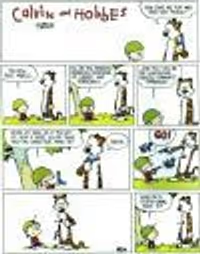Hasa or Diga - Which word is the f-word?
p.s.
Broadway Star Joined: 10/30/06
#1Hasa or Diga - Which word is the f-word?
Posted: 6/16/11 at 4:03pm
The phrase “Hasa Diga Eebowai!” [f-u God] includes the compound term “Hasa Diga.” Eebowai means God. My question is, which word is the f-word and which is the u-word?
Does hasa mean f and diga means you? Or maybe (in that language or dialect) the pronoun(?) “you” would precede the verb(?) “f”. So then the word for f is actually diga.
In support of the latter is the phrase “Ma ha nei bu, Eebawai!” – Thank you God!
Isn’t it possible (probable?) that nei bu means “thanks” and Ma ha means “you”, or perhaps “to you” (parallel to the ha or hasa of the f-u phrase)?
Any insight would be appreciated.
p.s.
It is also possible that the spacing is f’d up. Maybe the first word is ha or has (meaning “you”) (even more closely matching the “Thank you God” phrase); and the f-word is either Sadiga or Adiga. Remember, words/syllables are not always broken up as we would expect, and spelling is not always as in English –- “Sal Tlay Ka Siti” as an example.
Updated On: 6/16/11 at 04:03 PM
#2Hasa or Diga - Which word is the f-word?
Posted: 6/16/11 at 4:05pmThis is called "sucking all the funny out of a joke".
#2Hasa or Diga - Which word is the f-word?
Posted: 6/16/11 at 4:09pm
I totally agree, Jordan. I totally agree.
Oy!
#3Hasa or Diga - Which word is the f-word?
Posted: 6/16/11 at 4:10pmIt's a made up language. Why does it matter?
#5Hasa or Diga - Which word is the f-word?
Posted: 6/16/11 at 4:26pm
PalJoey - actually he doesn't, he just says "hasa diga" means f you.
Agreed that this is an incredibly stupid thread. Hopefully this is a failed attempt at humor and not a serious post.
#6Hasa or Diga - Which word is the f-word?
Posted: 6/16/11 at 4:35pm
I think it's a fun exercise, and doesn't suck any enjoyment out of anything for me. :)
Your analysis is promising. Perhaps ha is the unmarked form of the second-person pronoun, and this form is used after a preposition like ma. Then hasa could be the accusative form of the second-person pronoun, preceding the verb diga (as you suggest).
Who knows if Parker, Stone, or Lopez thought about any of this. Perhaps not, but I'm having fun thinking about it.
#7Hasa or Diga - Which word is the f-word?
Posted: 6/16/11 at 4:36pmBway is correct. It is a made up language. I saw an interview about this and, if I remember correctly, it was said that neither word means anything. So if you are thinking that because it is a "foreign language" and the order is switched. I don't think that is the case. Make sense?
#8Hasa or Diga - Which word is the f-word?
Posted: 6/16/11 at 4:44pmOf course it's a made up language. But apparently there are a few of us out here - a very few; I'm shocked I'm not the only one - who find it kind of fun to speculate about these things, even knowing they were pulled out of thin air.
#9Hasa or Diga - Which word is the f-word?
Posted: 6/16/11 at 4:45pmHow does one say it in Klingon?
#10Hasa or Diga - Which word is the f-word?
Posted: 6/16/11 at 5:00pm
I wonder if they ever thought about conjugating Diga.
Or what the past tense of Hasa would be.
blocked: logan2, Diamonds3, Hamilton22
#11Hasa or Diga - Which word is the f-word?
Posted: 6/16/11 at 5:02pm
Well, hasa is a pronoun, so it doesn't have a past tense. Keep up with the class! :)
As for the conjugation of diga, well, it's a pity the authors didn't give us more data to work with.
#12Hasa or Diga - Which word is the f-word?
Posted: 6/16/11 at 5:32pm
They didn't just randomly make up some words. Over the course of 10 years, they carefully developed and perfected and entirely new language for the show.
No one knows where their translation dictionary is, but many speculate it is buried somewhere with some gold plates.
#13Hasa or Diga - Which word is the f-word?
Posted: 6/16/11 at 5:46pmOr "hasa diga" isn't a literal word-for-word translation, which so frequently happens when translating between two languages. Of course, if it's a made-up language, that point kind of becomes moot, but often idioms of this nature are translated on the basis of general meaning rather than direct translation.
#15Hasa or Diga - Which word is the f-word?
Posted: 6/16/11 at 6:56pm
This is the most annoying thread I've ever read...
Just enjoy the show, dude.
Protector
Swing Joined: 9/7/11
#16Hasa or Diga - Which word is the f-word?
Posted: 9/7/11 at 10:33am
I'm thinking along the same lines as you p.s.
The phrase is clearly pronounced (by Michael Potts): "Has adiga eebowai". I just assumed that elder Cunningham messed it up as usual and Trey and Matt thought it'd be funnier to name the song after his mispronunciation. At least in Somali, "adiga" appears to mean "you". Also when you google "has adiga" you do get a lot of hits in some obscure language, possibly Somali. So I don't think they made it up originally.
/Johan
#17Hasa or Diga - Which word is the f-word?
Posted: 9/7/11 at 10:57am
'Also when you google "has adiga" you do get a lot of hits in some obscure language, possibly Somali.'
^Patently false.
IIIIIIIIIIIIIIIIIIIIIIIIIIIIIIIIIIIIIIIIIIIIIIIIIIIIIIII
IIIIIIIIIIIIIIIIIIIIIIIIIIIIIIIIIIIIIIIIIIIIIIIIIIIIIIII
IIIIIIIIIIIIIIIIIIIIIIIIIIIIIIIIIIIIIIIIIIIIIIIIIIIIIIII
IIIIIIIIIIIIIIIIIIIIIIIIIIIIIIIIIIIIIIIIIIIIIIIIIIIIIIII
IIIIIIIIIIIIIIIIIIIIIIIIIIIIIIIIIIIIIIIIIIIIIIIIIIIIIIII...
GOT DE GOLDEN PLATES!
Protector
Swing Joined: 9/7/11
SporkGoddess
Broadway Legend Joined: 7/27/05
#19Hasa or Diga - Which word is the f-word?
Posted: 9/7/11 at 11:02am
That's like asking what "derka derka" translates to.
#20Hasa or Diga - Which word is the f-word?
Posted: 9/7/11 at 11:10amThat means "green bean casserole."
#21Hasa or Diga - Which word is the f-word?
Posted: 9/7/11 at 5:10pm
"Ebowai means 'g-d', and hasa diga means 'f u!'". Get it? Nothing more too it.
Updated On: 5/7/19 at 05:10 PM
whatever2
Broadway Legend Joined: 8/25/06
#22Hasa or Diga - Which word is the f-word?
Posted: 9/7/11 at 6:54pm
in Esperanto, it's: fikighu Dio!
just sayin' ...
#23Hasa or Diga - Which word is the f-word?
Posted: 9/7/11 at 7:01pm
'"Ebowai means 'g-d', and hasa diga means 'f u!'".'
So... I guess, in English, it would be, "F u, g-d."
Rotel1026
Broadway Star Joined: 8/12/06
Videos













